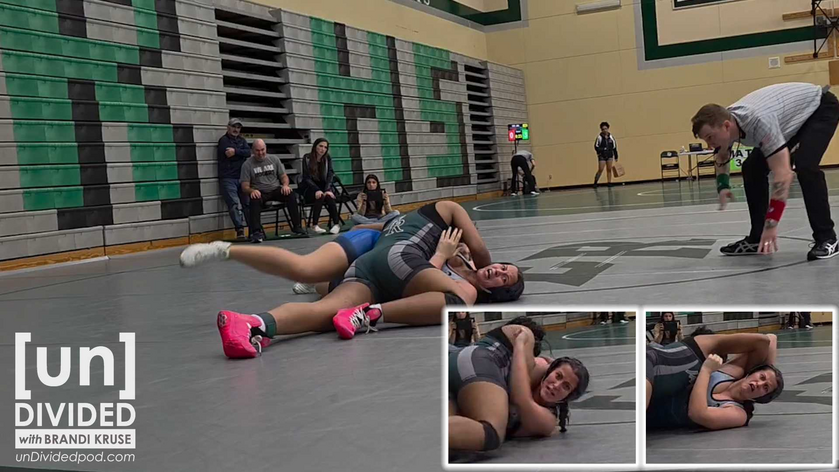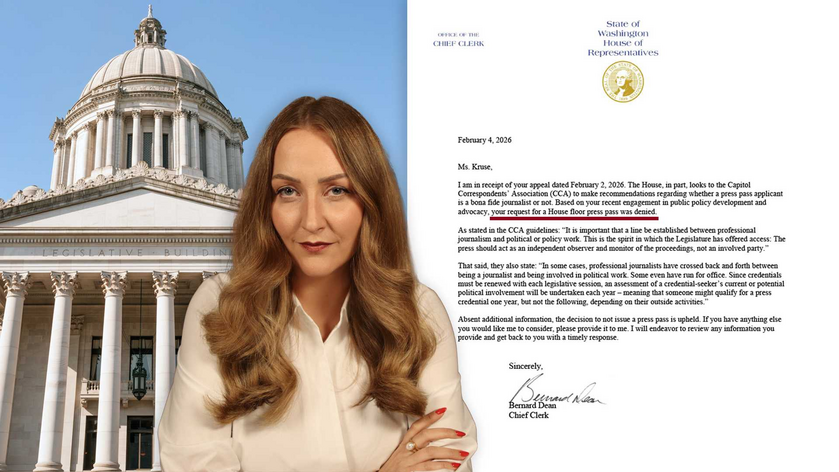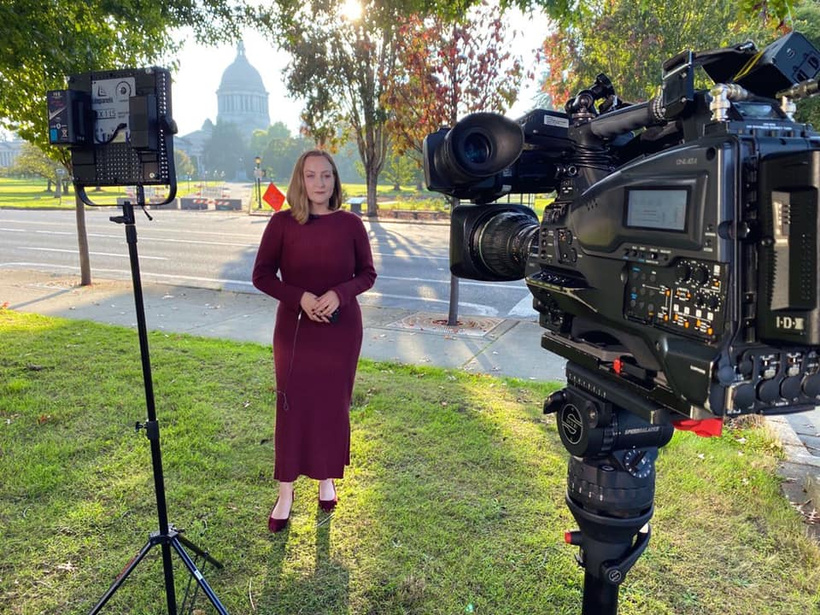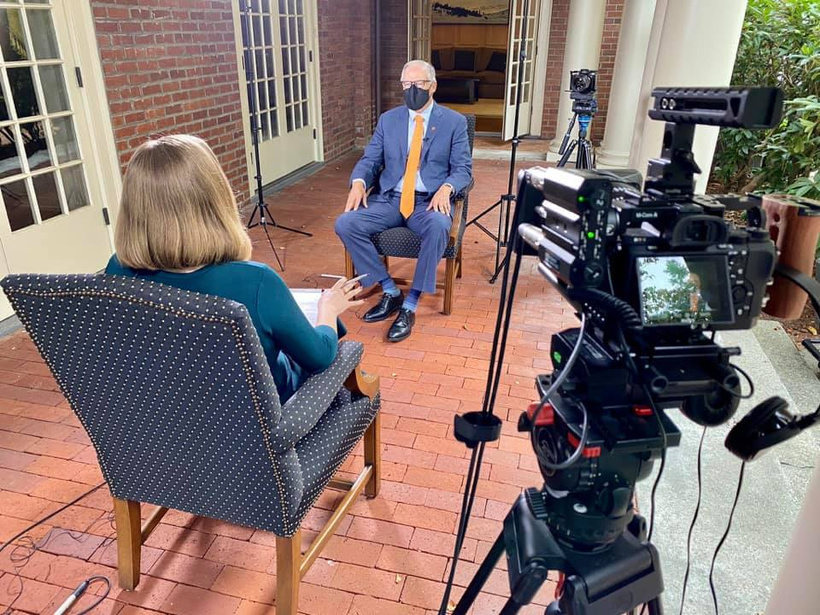Kallie Keeler has been wrestling her entire life.
The 16-year-old sophomore at Rogers High School in Puyallup says she's never experienced anything like what happened during a December 6 match with in-district rival Emerald Ridge High School.
A couple of minutes into the 190-pound bout, Kallie found herself face down on the mat – with her opponent's arm between her legs and fingers pressing into her vagina. Hard.
What happened – and didn’t happen – in the two months that followed highlights the extent to which public school districts in Washington state will go to to protect trans athletes at the expense of girls – and even at the expense of following the law.
The alleged assault
Video taken by Kallie’s mom on December 6 captures the disgust and panic in Kallie’s face. She tries to mouth something to her mom: "Her fingers are in my (vagina)."
Her mom can't make out what she’s saying and is on the wrong side of the mat to see what’s happening to her daughter. The referee is also out of the line of sight.
"I don’t know what she said. I don’t know why her face looked like that," her mom can be heard saying to someone off camera.
Traumatized and confused, Kallie decided to let her opponent pin her.
"I just wanted the match to be over," the teen told me, her hands grasping together. I could tell she felt awkward even talking about it.
After the match, Kallie immediately told her mom what happened.
"I couldn’t find my coach," she said. "There were other matches going on."
As she waited for a break in action to inform her coach of what she felt like was an intentional sexual assault, a coach from an opposing team came up to her and told her something that would make the ordeal even worse.
Kallie’s opponent was a biological boy.
"I was really shocked," Kallie said.
She had no idea. No one had told her before the match.
To be clear, Kallie intended to tell her coach what happened before knowing her opponent was a boy. But now, she felt violated in more ways than one.
Two months of inaction
Two days after the match, Kallie’s parents emailed coaches at Rogers High School to find out what they intended to do about what happened.
"This is a huge issue and something that is 100% not OK," her mom wrote. "The fact that this was done by a biological male who identifies as a female is an even bigger issue for me. Where do we go from here?"
Kallie had also spoken to her coach personally about the incident.
"I told her how uncomfortable the match made me feel. She said she was looking into it."
In a December 8 email response to Kallie's parents, her coach seemed to take the accusations seriously.
"I most certainly would not put Kallie on the mat if I thought she was competing with a male. I will investigate this and look to see if we have a video on our end. I will touch base with you either this afternoon or tomorrow morning after I do my due diligence."
The family says they never heard back.
Failure to report
Kallie decided to email unDivided about her story a few days after we reported that at least a dozen female athletes at Emerald Ridge High School were complaining to school administrators about the presence of two boys in their locker room. The girls told the school principal and vice principal that the boys made them uncomfortable.
In our January 22 story, we identified one of the two boys the girls complained about as a 190-pound wrestler on the girls' team.
That was when Kallie realized that more girls than just her were being hurt.
She emailed our tip line on January 25.
"Ever since that incident on the mat it has made me reconsider returning to wrestling because I'm not sure if I can or will feel safe on the wrestling mat," she said.
We emailed the Puyallup School District for comment on January 29.
The next day, the school reported Kallie's allegations to the Pierce County Sheriff's Office – nearly two months after district employees had a legal obligation to do so.
"This matter is currently under investigation. As such, the district is legally required to protect the privacy of students and families and cannot share details regarding individual students or specific incidents. What we can say is that student safety is a top priority and that all reports involving student safety are taken seriously," the district told us in an email on January 30.
The Pierce County Sheriff’s Office confirmed to unDivided that it has launched a criminal probe.
"The School Resource Officer informed me he was called by the school to investigate a report of sexual assault at a wrestling match. This incident allegedly happened during the match between the victim and a transgender student the victim was wrestling at the time. Last week, the School Resource Officer reviewed a video of the match, and he will be following up with the victim this week for further information. This is being investigated and is still active,” Pierce County Sheriff's Deputy Carly Cappeltto told unDivided in an email.
Still, the timeline is problematic – and potentially exposes school district staff who knew about Kallie's allegations to legal jeopardy.
Under Washington state law, public school employees are mandatory reporters if they suspect a child has been abused in any way – that obligation extends to accusations of sexual assault committed by other students, regardless of whether the teacher, coach, or staff members find those accusations to be credible or provable.
Failing to report such information to law enforcement is a gross misdemeanor, punishable by up to a year in jail, a $5,000 fine, or both.
While it's unclear how many district employees knew of the allegations, based on emails reviewed by unDivided and conversations Kallie and her family had directly with school officials, we believe at least four district employees failed to meet mandatory reporting requirements: Two coaches, a principal, and an athletic director.
Proving intentional assault
Wrestling is a contact sport. Anyone who's ever watched a match knows hands can end up in all sorts of places.
But is what happened to Kallie normal?
No, say two experts who reviewed the video. Neither have any connection to Kallie or Emerald Ridge.
A coach who has 39 years of wrestling experience said there is a joke among wrestlers about "checking the oil." It's when someone's fingers – usually unintentionally – penetrate their opponent.
The expert said this is typically fleeting and happens rarely. He said that in nearly four decades of wrestling and coaching, this has never happened to him, nor have any of his wrestlers reported it happening.
If it did, he said, the contact would be brief as the offending wrestler would move their hand immediately – or risk a flagrant foul and/or disqualification.
After reviewing the video, he said there was no reason in that moment that Kallie’s opponent needed to put his arm between her legs. He said it looked intentional.
A female wrestling coach who reviewed the video for unDivided agreed.
"That’s not common, unless you’re doing it intentionally."
unDivided provided contact information to the Puyallup School District to pass along to the wrestler and his family for comment. We are choosing not to name him because he is a minor and has not been charged with or convicted of a crime.
What happens next
The ordeal comes as the Washington state legislature is faced with passing, or sending to voters, an initiative that would prohibit biological boys from competing against girls.
Since Democrats in the majority have refused to hold hearings on the initiatives, it will likely head to voters for a decision in November.
While she says she would have reported the assault even if her opponent had been a female, Kallie says she should have been able to make an informed choice that day about whether to wrestle a boy.
"Boys shouldn’t be allowed in women's sports, whether they identify as female or not," she said. "Especially in strength-based sports."
While it is common for boys to wrestle girls in elementary and middle school, Kallie said the physical advantage becomes more apparent as boys and girls develop further.
"Women’s wrestling has grown so much within the last couple years. I don’t want it to shrink again with this whole situation going on."
It's worth noting that over the weekend, the 190-pound Emerald Ridge wrestler advanced to state as a freshman, beating older, more experienced female competitors.
Editorial note: Kallie will join unDivided during our regular live show Monday, February 9 at 12pm PT.



















